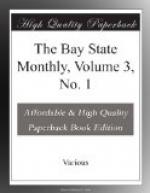“May we come?” asked the foremost young man, bowing to each of the ladies.
“It is rather late to ask that,” returned Madam Archdale, “but as you are here, we will try to make you welcome.”
And they sat there talking until the sun grew too hot for them.
Meanwhile, Elizabeth Royal, the subject of Lady Dacre’s curiosity, was thinking of the visit she was on her way to make which would bring her within a few miles of Seascape. She dreaded it, yet she knew that her father was right when he told her that the more she could appear to treat the question of this marriage as a jest,—a thing which meant nothing to her,—the wiser she would be. This was the course that by her father’s advice she had marked out for herself. Elizabeth Royal had her faults; she sometimes tried her friends a good deal by them; but if she had been Lot’s wife, and had gone out of Sodom with him, she would never have been left on the plain as a bitter warning against vacillation. Only, it seemed to her a very long time since her restful days had gone by, and she realized that the one course she hated was to do things because it was good policy to do them. Before Archdale she was brave; not only from pride, but out of pity to him; before others, all but her father, pride restrained her from complaint, even from admission of the possibility of the disaster she feared. But alone her courage often ebbed.
CHAPTER XV.
THE GUESTS.
The fourth morning from this as Madam Archdale and her guest were on their way to the garden they met Archdale in the hall.
“Come with us,” cried Lady Dacre to him, pointing through the open door. But Archdale had letters to write and the ladies went on without him. A few rods away they saw Edmonson seated under an elm near the door. “He has lost his shadow,” whispered Lady Dacre to her companion as they drew near, and she repeated Stephen’s speech. Her listener smiled. Edmonson rose as he saw them and sauntered beside them through the shaded walks. But for all his brilliant conversation he did not keep Lady Dacre from remembering the gloomy look she had surprised upon his face. As they were walking Bulchester joined them. He explained that he had been paying a visit to Madam Pepperell, whom he had met in Boston during the spring. Lady Dacre noticed that he and his friend exchanged significant glances, but neither spoke to the other. Edmonson devoted himself to her, while Bulchester walked on with his hostess.
At last they all sat down to rest where the sea-breeze beginning to blow brought a refreshing coolness. Sir Temple Dacre came out looking for them, and on being questioned by his wife as to where Archdale was, professed his ignorance. “He must have a larger correspondence than you,” she returned, “if he is still at work; he told me that he had letters to write.”
“I think he has gone to ask a friend of his to dine with us,” said his mother. “I saw him gallop off half an hour ago. We are going to be very quiet to-day that you may have a chance to rest; tomorrow guests have been invited to meet you. Stephen thought that this evening you might like a sail,—unless you have had too much of the water?” And she turned inquiringly to Lady Dacre.




